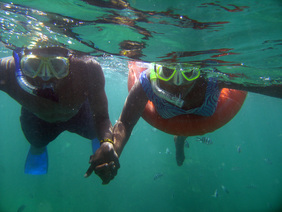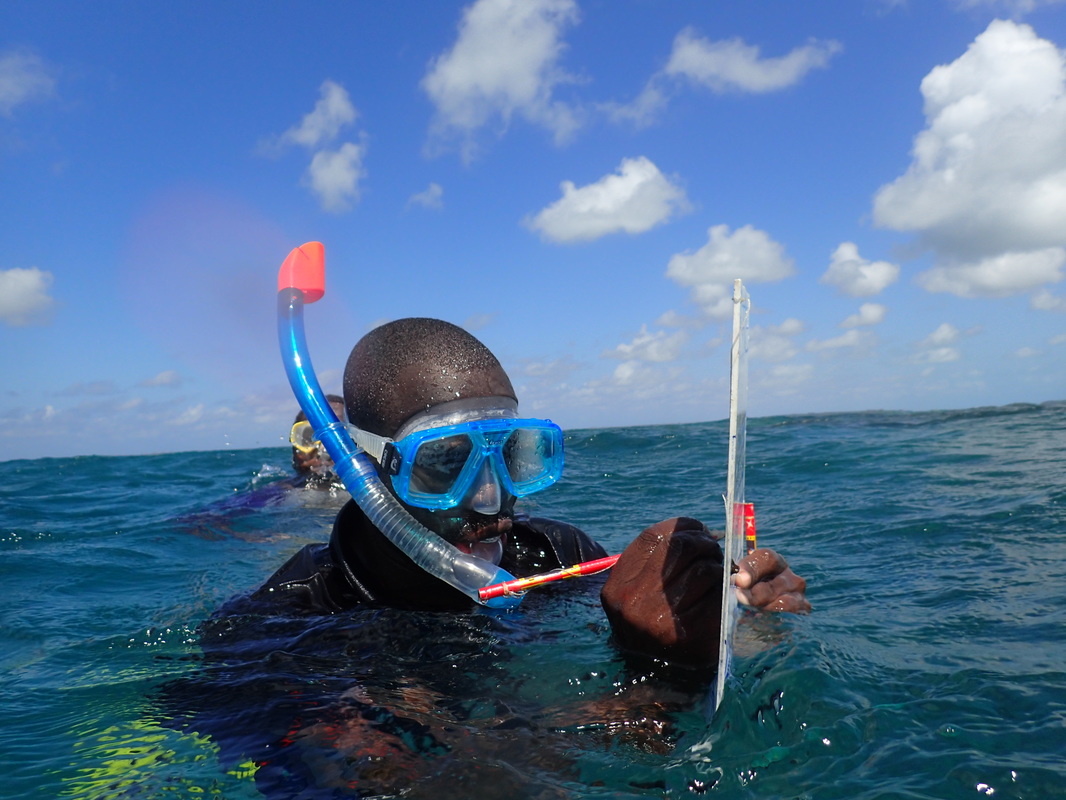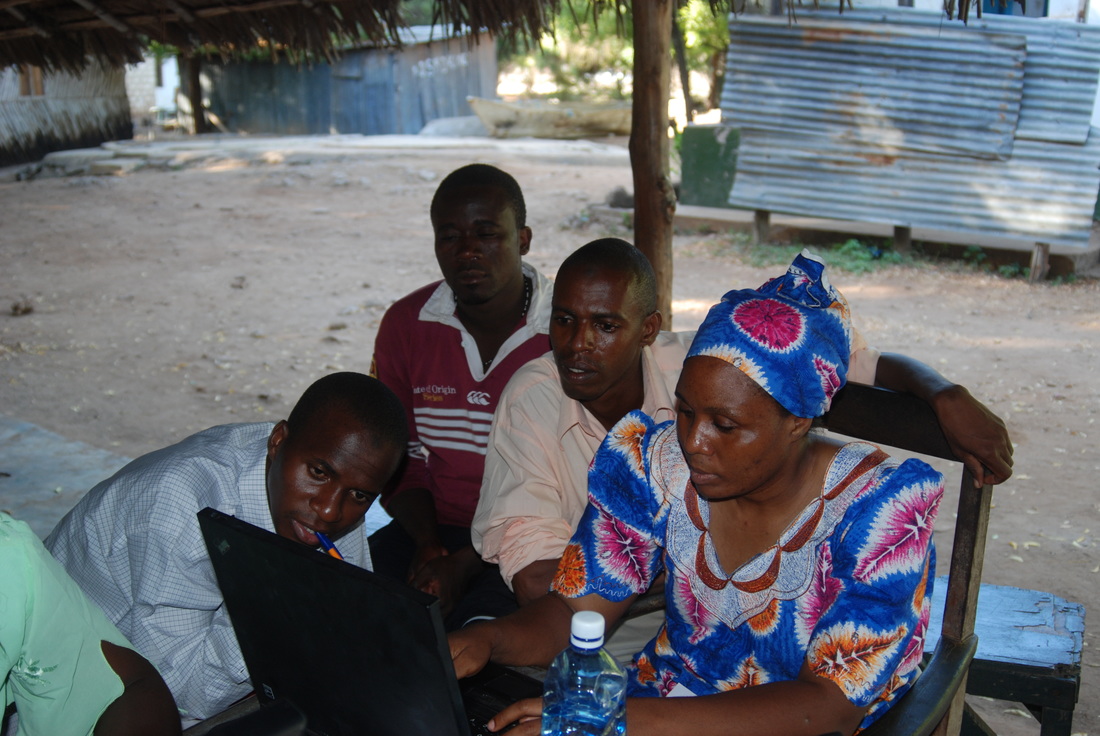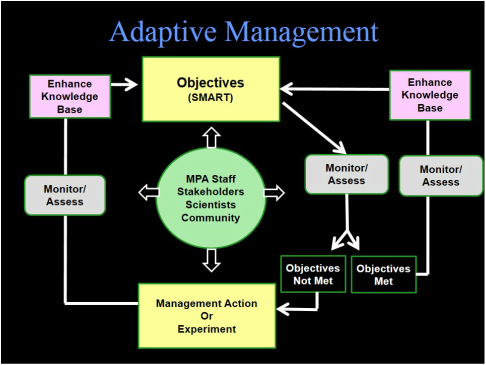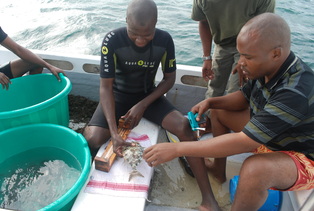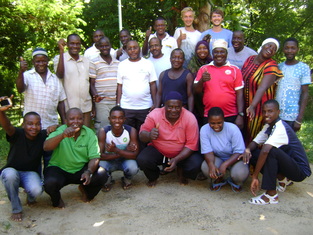SMART Seas Africa:
Strategic Adaptive Management (SAM) In Practice
Strategic Adaptive Management (SAM) In Practice
Quotes from Kenya Wildlife Service (KWS) Park Wardens
" The SMART Seas SAM approach is one of the best programs in KWS that I have ever participated in over the last 25 years."
"Before using SAM, we were not managing our MPAs. Now we know MPA status and focus on problem solving."
" The SMART Seas SAM approach is one of the best programs in KWS that I have ever participated in over the last 25 years."
"Before using SAM, we were not managing our MPAs. Now we know MPA status and focus on problem solving."
What SMART Seas Africa Does:
The SMART Seas Africa Network meets a critical global challenge: marine protected areas (MPAs) are being established rapidly globally, but are not managed for sustainability. Only ~1/3 of the MPAs in existence around the world have demonstrated progress toward meeting goals & objectives, and most MPAs do not use scientific information to assess status. Yet, we are globally striving towards 30% MPA protection.
SMART Seas co-designed an approach to effective and science-based MPA management (SAM) in the Western Indian Ocean (WIO) with the Kenya Wildlife Service, Tanzania Marine Parks & Reserves Unit, and the Seychelles National Parks Authority along with associated fishing communities. We now form a network of over 500 MPA practitioners and community members across 9 WIO nations.
SMART Seas, through supporting application of the SAM (or Strategic Adaptive Management approach) helps managers and fishing communities in Western Indian Ocean marine protected areas (MPAs) link science to active and adaptive management, ensuring that MPAs deliver expected ecological and social benefits. Through the SAM approach, MPAs have achieved major new milestones:
The SMART Seas Africa Network meets a critical global challenge: marine protected areas (MPAs) are being established rapidly globally, but are not managed for sustainability. Only ~1/3 of the MPAs in existence around the world have demonstrated progress toward meeting goals & objectives, and most MPAs do not use scientific information to assess status. Yet, we are globally striving towards 30% MPA protection.
SMART Seas co-designed an approach to effective and science-based MPA management (SAM) in the Western Indian Ocean (WIO) with the Kenya Wildlife Service, Tanzania Marine Parks & Reserves Unit, and the Seychelles National Parks Authority along with associated fishing communities. We now form a network of over 500 MPA practitioners and community members across 9 WIO nations.
SMART Seas, through supporting application of the SAM (or Strategic Adaptive Management approach) helps managers and fishing communities in Western Indian Ocean marine protected areas (MPAs) link science to active and adaptive management, ensuring that MPAs deliver expected ecological and social benefits. Through the SAM approach, MPAs have achieved major new milestones:
- >200 km2 of seagrass beds were recovered in Mombasa, Kenya
- MPAs in Kenya and Tanzania have established strong co-management programs with fishers and other beach stakeholders
- Millions of kg's of plastic trash have been removed from beaches by the MPA network over the last year alone
- MPAs now have robust monthly data to track status and trends of core MPA habitats and species, as well as human use data
- Fishers in Tanzania are trialing temporary octopus closures as a conservation and income generating tool
- MPA staff and fishers are passionate and empowered to make change!
|
SMART Seas works by: 1) Working with managers and fishers to develop management objectives based on agency or community policy and community values. In this process, we promote collaborative thinking and problem solving. We then develop numeric targets that are scientifically reviewed. Objectives cover a suite of ecological and social indicators of management effectiveness. 2) Helping managers and fishers determine what data are needed to assess progress toward objectives. 3) Training managers and community embers in monitoring of ecological and social parameters to fill data gaps and allow managers and communities to keep aware of MPA status. Engagement in monitoring builds passion for conservation. 4) Helping managers and fishers communicate their data needs effectively to researchers 5) Providing a streamlined format for researchers to directly inform management 6) Guiding managers and fishers in evaluating options for management action and then assessing the effectiveness of actions taken. 7) Engaging stakeholders in MPA management by involving fishers and communities in every aspect of the management process. In doing this, SAM helps create greater marine awareness and improve community perceptions of MPA benefits. |
SMART Seas is not a single training event - it is a way of managing MPAs and marine systems effectively. We provides ongoing mentoring and a support network that helps continually improve management and achieve conservation change. We work to create a collaborative management atmosphere that builds passion for conservation and facilitates innovation.
|
Why Adaptive Management?
Globally, governments are striving to incorporate 10-30% of oceans as MPAs. Often, however, existing MPAs fall short in effectiveness, failing to deliver promised ecological and societal benefits. MPAs must be actively assessed and managed to maintain benefits despite increasing external threats (including climate change). Assessment of MPA status and proactive management require information sources, but, despite much research on MPAs, managers commonly lack access to scientific information or do not have the capacity and framework to interpret and use it. Adaptive management provides a framework for managers to access and use research findings. |
Through adaptive management, measurable objectives are established and actions are based on the status of objectives. Managers evaluate previous management actions in a system of continual learning. Management actions are thus experiments that improve knowledge of social-ecological dynamics and allow for forward momentum. Adaptive management is thus particularly important in data-poor management contexts because value is placed on building information and knowledge over time.
In collaborative implementation of adaptive management frameworks, managers and stakeholders think through what information is needed to assess management progress, and researchers learn about management needs.
Adaptive management thus helps develop problem solving approaches, resulting in innovative conservation solutions and new levels of management action without increasing costs because resources are targeted toward identified problems.
In collaborative implementation of adaptive management frameworks, managers and stakeholders think through what information is needed to assess management progress, and researchers learn about management needs.
Adaptive management thus helps develop problem solving approaches, resulting in innovative conservation solutions and new levels of management action without increasing costs because resources are targeted toward identified problems.
|
|
Does SAM work?
Our approach started as a pilot programme in a single MPA (the Mombasa Marine Park & Reserve) in Kenya in 2009. The programme transformed staff and community attitudes in the Mombasa MPA and resulted in numerous successful management actions. For example, beaches have been kept free of plastic trash for years, invasive plants have been eradicated increasing nesting sites for sea turtles, fishers have been engaged in MPA research on fish movement enhancing their appreciation of MPAs. Most importantly, the MPA staff and surrounding community developed a passion for conservation. Collectively they have conducted hundreds of monthly surveys, and trainees now serve as trainers for new MPA staff and community members (hence their self-proclaimed name: the Mombasa Marine University). Read about Mombasa's use of SMART Seas "SAM" approach on National Geographic's website here! Based on this success, the SAM approach is now a national MPA programme with the Kenya Wildlife Service in Kenya, Tanzania has launched a pilot programme in Mafia Island Marine Park with plans to expand nationwide through the Tanzania Marine Parks Unit, a private MPA in Tanzania (Chumbe Island Coral Park) has adopted the approach, and other Western Indian Ocean nations are asking to join. |
In all cases of SMART Seas implementation, we are seeing measurable changes in how marine management is done and are seeing managers and community members actively addressing major conservation challenges.
SMART Seas Products and Services:
- Training Manual (in development)
- Trainings (ranging in length from 1 day to several weeks using participatory methods)
- MPA staff and stakeholder knowledge, values, perceptions, and skills assessment surveys
- Peer reviewed management objectives with targets for Kenya and Tanzania
- Monitoring protocols for coral reefs, seagrass beds, beaches, fish catch, and human communities
- Monthly MPA record keeping forms
- Researcher data sharing forms (streamlining information for MPA manager use)
- Database system for WIO MPAs (in development)
- Management Actions Planning Guide
- Management Action Evaluation Guidelines
- Mentoring programme for MPAs starting the SAM process
- Peer training programme through staff exchanges between MPAs
- SAM Trainer Course (in development)
- WIO MPA networking through Facebook page and WIO Chat - allowing sharing of resources and information
- MPA Champions Awards: recognizing excellent contributions by MPA staff & stakeholders to conservation (meet a champion here)
- Facebook group facilitating idea exchange between 400 regional practitioners from 9 nations
- Training Manual (in development)
- Trainings (ranging in length from 1 day to several weeks using participatory methods)
- MPA staff and stakeholder knowledge, values, perceptions, and skills assessment surveys
- Peer reviewed management objectives with targets for Kenya and Tanzania
- Monitoring protocols for coral reefs, seagrass beds, beaches, fish catch, and human communities
- Monthly MPA record keeping forms
- Researcher data sharing forms (streamlining information for MPA manager use)
- Database system for WIO MPAs (in development)
- Management Actions Planning Guide
- Management Action Evaluation Guidelines
- Mentoring programme for MPAs starting the SAM process
- Peer training programme through staff exchanges between MPAs
- SAM Trainer Course (in development)
- WIO MPA networking through Facebook page and WIO Chat - allowing sharing of resources and information
- MPA Champions Awards: recognizing excellent contributions by MPA staff & stakeholders to conservation (meet a champion here)
- Facebook group facilitating idea exchange between 400 regional practitioners from 9 nations

